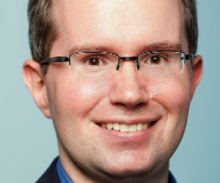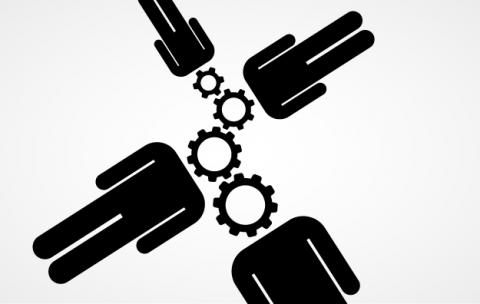In Part 1 of The Enterprisers Project interview with Dr. David A. Bray, an Eisenhower Fellow who recently traveled to Taiwan and Australia to discuss the Internet of Everything with industry and government leaders, Dr. Bray discussed how a hyper-connected, Internet-enabled future may impact the role of both the CIO and the CEO. While his 2015 travels abroad as an Eisenhower Fellow were in a personal capacity only, Dr. Bray is also chief information officer for the U.S. Federal Communications Commission. Here he dives deeper into what CIOs can do now to lead their organizations into an Internet of Everything era.
The Enterprisers Project (TEP): When can CIOs and CEOs expect the Internet of Everything to impact their organizations? Is this happening now?

Dr. David A. Bray: Yes, it is already underway; and if CIOs and CEOs haven't already started thinking about it, they should make it a priority. On the front lines, CIOs are already all too aware that the lines between business units are beginning to blur, with various teams outside of IT sharing ownership of technology projects. I think partnerships across any organization are essential. I also highly encourage leaders to cultivate bottom-up “change agents” within their organization, closely tied to mission needs and priorities, to begin to try new ideas out across the enterprise as we chart the unmapped future ahead.
CIOs and CEOs must open their eyes to the reality that organizational boundaries are beginning to fade as well, as each employee comes to work with their own various connected devices strapped to their wrists, clipped to their shoes, or – in the near future – even embedded into their bodies. The Internet of Everything will make it difficult to know where your organization starts and stops. There are opportunities in this shift, as well as challenges.
I believe that with the right pairing of a strategic, future-focused CEO and CIO, the role of CIOs in more progressive organizations will evolve in the age of the Internet of Everything towards more of Chief Strategy Officer. In other words, progressive CEOs will expect their CIOs to act like a venture capitalist on the inside, seeking new, transformative ideas and solutions to ensure the organization delivers great results, continues being relevant, and is resilient to the changes ahead.
TEP: How can CIOs be leaders in this transformation?
Dr. Bray: The CIO should lead by embracing positive, Internet-enabled change and encouraging everyone in the workplace to do the same. CIOs should encourage people to use new technology in the workplace as well as encourage individuals to make sure it’s being used responsibly and with resiliency. Championing responsible use and resiliency is essential as it’s unfortunate that almost on a daily basis we hear of data breaches or other cybersecurity incidents. They’re one of my biggest concerns as a CIO.
Specifically: organizations want and need to use the Internet to deliver results, yet they also need to adopt approaches that are resilient and protect the privacy of both personal and organizational data. I intentionally use the word “resiliency” versus security because borders are not only hard to define, but they are also porous and difficult to defend.
During my discussions with leaders in Taiwan and Australia, several of them raised the point that the only way you can guarantee 100 percent security is to unplug yourself from the Internet, bury your system underground and ensure that no human touches it. In a connected world in which there is an explosion of devices just about everywhere, 100 percent security while also being connected to the internet just isn’t possible. CIOs should ensure their workforce are strategic partners for every step an organization takes into the era of the Internet of Everything. Such an approach is absolutely critical.
TEP: Do you perceive a sense of urgency regarding how the Internet of Everything will impact individuals, organizations, and even nations?
Dr. Bray: Yes, I do perceive a sense of urgency. It stems from the fact that humans globally roll out technologies with unintended second- and third-order effects. Take social media as an example: while there is a huge upside to it, you can't avoid the fact that most humans will have pre-established biases and views. These may derail your intentions and expectations of using social channels to encourage thoughtful and civil deliberation among people that have different opinions.
Similarly, with the Internet of Everything, I'd caution CIOs and CEOs to be on the lookout for those unknown and unintended second- and third-order consequences. It is likely, I believe, that 95 percent of the time, people will use their newly empowered “hyperconnected” status gained through the Internet of Everything toward good ends, but that small 5 percent sliver of uncertainty could potentially destabilize the processes within an organization, within a sector, or even within a nation. CIOs and CEOs in general need to be having discussions now about how to “upgrade” how we work – in organizations, across sectors, and even within nations – for decades ahead.
Both industry and government leaders in Taiwan and Australia raised the point that traditional democratic processes were designed to have checks and balances, to be intentionally deliberative, and to prevent any one person from getting too much power. The Internet of Everything creates social pressures in terms of reducing the time available for both organizations and nations to deliberate strategically and ensure appropriate checks and balances.
Forward-thinking CIOs and CEOs can be strategic in how they generate and implement disruption from both within and outside of an organization. The goal should be to use the disruptive elements of the Internet of Everything to transform how any organization – whether it is a startup or established one – works with both internal and external stakeholders in a way that's much more nimble, resilient, and responsive than ever before.
Dr. David A. Bray serves as Chief Information Officer (CIO) for the Federal Communications Commission, overseeing the Commission's efforts to modernize legacy systems and transform technology partnerships in telecommunications, broadband, competition, the spectrum, the media, public safety, and security. He was selected to serve as a member of the Council on Foreign Relations and as a Visiting Associate for the Cybersecurity Working Group on Culture at the University of Oxford in 2014.




